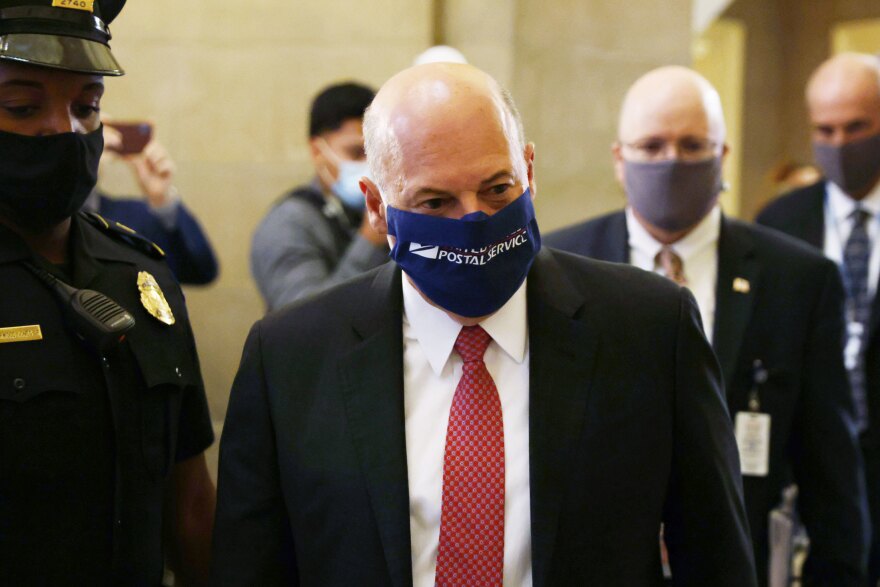Updated at 3:07 p.m. ET
Postmaster General Louis DeJoy backed off planned changes to the Postal Service on Tuesday that critics had worried might threaten voting by mail this year, but Democrats say they aren't satisfied and want more answers.
Michigan's Gary Peters, the ranking Democrat on the Senate committee that had scheduled a hearing with DeJoy on Friday to discuss the planned Postal Service changes, said he wants the session to go ahead and he wants to press DeJoy about what led to this flap.
While Peters and other Democrats welcomed DeJoy's announcement that he'll postpone alterations to Postal Service practices until after the November election, they also said they want to know whether the system as it stands today can be restored to the level of capacity it was at before DeJoy's arrival.
"The American people deserve to know whether he will be returning sorting machines he already removed from facilities across the country, the details of any changes he is leaving in place and any future changes he plans to enact that could continue to harm the millions of Americans who count on the Postal Service for reliable, timely delivery," Peters said in a statement.
DeJoy ordered an "operational pivot" for the Postal Service's practices earlier this year that advocates warned would delay mail and deliveries at a time when demand has grown because of the coronavirus crisis.
House Speaker Nancy Pelosi, D-Calif., said she would not accept the alterations DeJoy has made thus far as the new baselines and that there was little substance to DeJoy's announcement.
"The Postmaster General's alleged pause is wholly insufficient and does not reverse damage already wreaked," said Pelosi in a statement Wednesday after speaking to DeJoy. "The Postmaster General frankly admitted that he had no intention of replacing the sorting machines, blue mailboxes and other key mail infrastructure that have been removed and that plans for adequate overtime, which is critical for the timely delivery of mail, are not in the works."
Pelosi said she intends to go ahead with plans to return the House from its summer recess on Saturday to take up a measure that would authorize $25 billion for the Postal Service and prohibit it from conducting operations below the level of service it had in place on Jan. 1.
Pelosi echoed Democrats' sustained message that the Postal Service must preserve or improve its capacity given the expected surge of mailed ballots this election year. Many more voters than usual are expected to try to vote by mail to avoid going to polling places in person in an effort to minimize social contact.
"During a pandemic, the Postal Service is election central," Pelosi said. "No one should be forced to choose between their health and their vote."
DeJoy is also due to appear before the House Oversight Committee on Monday in a hearing that was added to the schedule amid concern by Democrats about capacity reductions within the Postal Service.
GOP donor now in spotlight
The postmaster general, who has been in his job since the spring, is a Republican fundraiser and supporter of President Trump, but he said on Tuesday that he wanted to freeze the service alterations he had ordered to avoid the appearance that he was attempting to interfere with the election.
The Postal Service can handle the work this election is expected to require, DeJoy vowed.
"The Postal Service is ready today to handle whatever volume of election mail it receives this fall," he said. "Even with the challenges of keeping our employees and customers safe and healthy as they operate amid a pandemic, we will deliver the nation's election mail on time and within our well-established service standards."
White House chief of staff Mark Meadows, meanwhile, told reporters on Wednesday that DeJoy had initiated the changes within the Postal Service on his own, not after an instruction from the president.
The chief of staff observed that the agency has experienced declining volumes and financial difficulties for years and that the need to reform the Postal Service is clear.
"The business model for the postal system is not one that's sustainable," Meadows said.
Some political figures argue the Postal Service should operate more like a private business; agency supporters argue that it was conceived as — and must remain — a "service."
Trump himself said on Tuesday that as far as he is concerned, the Postal Service "is running as well as it has in a long time."
President faults election integrity
Trump has spent weeks raising doubts about the integrity of the election, focusing criticism on voting by mail.
Although he and others in his camp vote by mail themselves, the president has repeated unfounded claims about its susceptibility to fraud or foreign interference. Trump has made inaccurate claims about voting and elections for years, claims that a panel he appointed to investigate the issue could not substantiate.
Anecdotal reports from across the country about late or missed deliveries have grown lately, but it isn't precisely clear from the Postal Service how its throughput locally or nationally might have been reduced.
Critics, however, have linked the changes within the Postal Service to Trump's rhetoric and say the administration was caught red-handed trying to slow down mail service for its own political purposes.
Democratic National Committee Chairman Tom Perez said as much to NPR on Monday, and on Tuesday, Sen. Maggie Hassan, D-N.H., argued that because so many Americans rely on the Postal Service, they would reject DeJoy's program.
Hassan vowed that she would question DeJoy at the hearing on Friday about the broader issues she said are caused by service disruptions or reductions.
"The American people spoke out loudly and clearly against the Trump administration's changes to the Postal Service. Granite Staters – especially those in rural communities – rely on USPS to get their medication and to run their small businesses," Hassan said.
Copyright 2020 NPR. To see more, visit https://www.npr.org. 9(MDAwMzY5MzE4MDEzMTE3ODg5NDA4ZjRiNg004))


